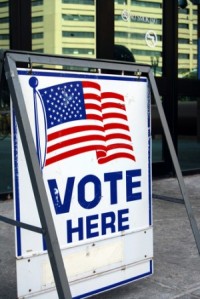In 5 AM order, SCOTUS allows Texas voter ID law to take effect; holdup apparently due to dissent

Photo from Shutterstock.
Updated: The U.S. Supreme Court apparently pulled an all-nighter before issuing an order at 5 a.m. Saturday allowing Texas’ voter ID law to take effect for early voting beginning on Monday.
Justice Ruth Bader Ginsburg’s six-page dissent (PDF) was the apparent cause of the holdup, Slate reports in a column by University of California at Irvine law professor Richard Hasen. Ginsburg’s dissent, joined by Justices Elena Kagan and Sonia Sotomayor, said the law’s procedures are “the strictest regime in the country.”
The law “likely imposes an unconstitutional poll tax and risks denying the right to vote to hundreds of thousands of eligible voters,” Ginsburg wrote.
The Texas law restricts the number of acceptable identifications, Ginsburg said. Texas won’t accept photo IDs from an in-state four-year college, from a federally recognized Indian tribe, or from the U.S. Department of Veterans Affairs. (Ginsburg later acknowledged she was wrong about the Veterans IDs and cut the sentence in a revised opinion.) Those without the required ID can obtain an “election identification certificate” from the Texas Department of Public Safety, which generally requires a certified birth certificate. Round-trip travel times to the nearest government office to obtain the certificate can be as long as three hours or more, Ginsburg said.
The cost of the birth certificate sent by mail is at least $22. Reduced-fee certificates are available for $2 or $3, Ginsburg said, but that option wasn’t publicized on the DPS website or on the Department of Health and Human Services forms for requesting birth certificates.
News organizations waited all night for the Supreme Court’s order. Publications with stories include the New York Times, the Washington Post, the Los Angeles Times, the National Law Journal and SCOTUSblog.
After a trial, a federal judge had concluded the law amounted to an unconstitutional poll tax and issued a permanent injunction. Citing the possibility of confusion, the New Orleans-based 5th U.S. Circuit Court of Appeals reinstated the law.
“The fact-intensive nature of this case does not justify the Court of Appeals’ stay order,” Ginsburg wrote. “To the contrary, the 5th Circuit’s refusal to home in on the facts found by the district court is precisely why this court should vacate the stay.”
The Supreme Court took an opposite tack on Oct. 9 when it refused to allow a Wisconsin voter ID law to take effect after early voting had begun. But both orders were consistent with the principle that courts should not change the rules close to an election, Hasen says.
U.S. Attorney General Eric Holder released a statement on Saturday criticizing the Supreme Court’s order. “It is a major step backward to let stand a law that a federal court, after a lengthy trial, has determined was designed to discriminate,” he said.
Updated on Oct. 23 to include information about a revision to Ginsburg’s opinion.



